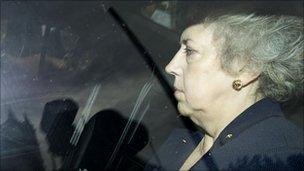Iraq inquiry: Ex MI5 chief pulls no punches
- Published

Baroness Manningham-Buller says she saw no link between 9/11 and Saddam Hussein's Iraq
The car carrying Baroness Manningham-Buller glided into the underground parking garage at the QEII Centre shortly before 10am on Tuesday.
It was no surprise that the former head of MI5 preferred to avoid the photographers and TV camera crews waiting for her outside the front entrance.
Significantly though, Eliza Manningham-Buller was coming out of the shadows to give evidence in public to the Iraq inquiry.
She is the first witness from the Security Service, although the Chilcot inquiry has taken evidence both publicly, and behind closed doors, from MI6 officials, including the former head, Sir John Scarlett.
Manningham-Buller's biography makes interesting reading.
After graduating, she worked as a teacher at the exclusive Queen's Gate school in London, but in 1974 she joined MI5 at the height of the Cold War and went on to become an expert in counter-terrorism.
Three decades earlier, before she was born, her mother was training pigeons to carry World War II secret communications from the continent.
'No credible intelligence'
Since her retirement from MI5, Manningham-Buller has given press interviews, and appeared on 91»»±¨ Radio's "Desert Island Discs" programme.
She began her evidence this week with an outline of the role of the Security Service, but quickly moved on to the events surrounding the 9/11 attacks in America in 2001. She recalled flying over New York on the day after, when the fires were still burning.
"It did not occur to me that we would be going to war in Iraq a year and a half later", she told the inquiry.
"To my mind, Iraq, Saddam Hussein, had nothing to do with 9/11 and I have never seen anything to make me change my mind".
Committee member, Sir Lawrence Freedman wanted to know if she had been given sight of some of the material produced by the Pentagon, that suggested an alternative view.
"I don't think I was. Probably a good thing; it would have made me cross," Manningham-Buller replied with a flash of humour.
Her testimony was backed up by a letter which she wrote in March 2002 (a year before the Iraq war) and which has now been declassified.
"There is no credible intelligence that demonstrates that Iraq was implicated in planning the 11 September attacks," read the letter.
'Radicalised' youth
In front of Sir John Chilcot and his colleagues, the former MI5 chief chose her words very carefully, but pulled no punches as she launched into a frank assessment of the impact of the Iraq invasion of 2003.
Britain's involvement in Iraq had "radicalised" young British Muslims, some of whom were third generation Britons.
"We didn't foresee the degree to which British citizens would become involved," she admitted.
She described how some 70 or 80 Britons had gone to fight against coalition forces in Iraq, and she said there had been 16 substantial terror plots in the UK, 12 of which were stopped.
Some observers may have been surprised by the revelation that Manningham-Buller appears not to have had any direct communications with Tony Blair during her time at MI5, although she did ask the prime minister for a doubling of MI5's budget in 2003 because of Iraq.
She made it clear that she had not been part of the Joint Intelligence Committee (JIC) at the time of the controversial dossier on Iraq's weapons of mass destruction in September 2002.
She cautioned against "an over-reliance on fragmentary intelligence".
"People talk in hushed tones about the Joint Intelligence Committee", she added.
"It is another Whitehall committee. It is fallible.... looking back through the JIC reports, I think it was pretty good on the terrorist threat actually; much less good on Iraq".
Common sense advice
For those left wondering why she had not done more to challenge the incomplete intelligence picture, she offered this explanation: "The people who knew about Iraq and WMD were Foreign Office, Ministry of Defence, SIS, DIS, not my Service".
As the session drew to a close, the former spy chief had some common sense advice for new ministers.
"My recollection is there used to be some formal induction for ministers, not just about leaving their papers on a train and looking after their laptop, but some more formal discussion on how to understand and approach intelligence."
She agreed with Sir John Chilcot's suggestion that if this had fallen away, it needed to be restored.
By the standards of the Iraq inquiry, the evidence session was short - lasting just 72 minutes - but Baroness Manningham-Buller reignited media interest in these public hearings.
She also set the scene for the final week when the witnesses will include Hans Blix, the former UN chief weapons inspector, and Lord Prescott, the former deputy prime minister.